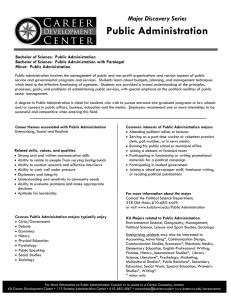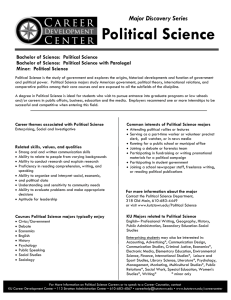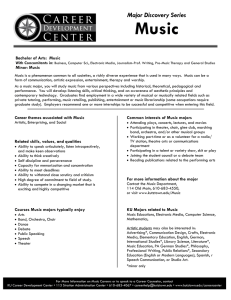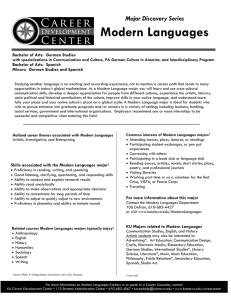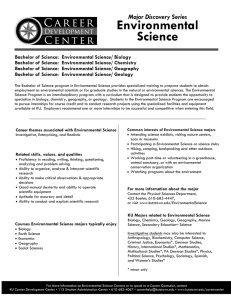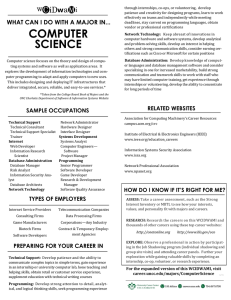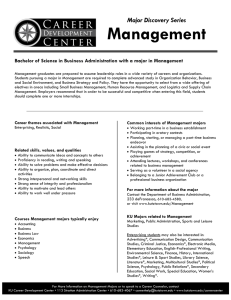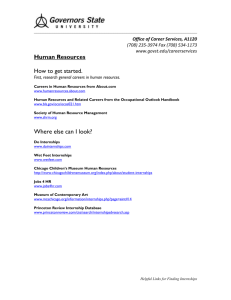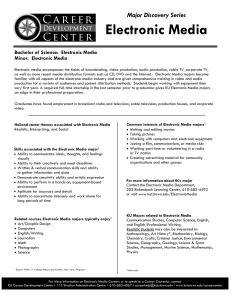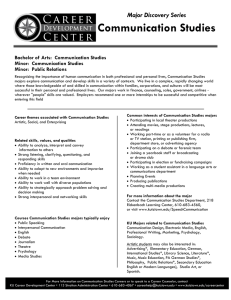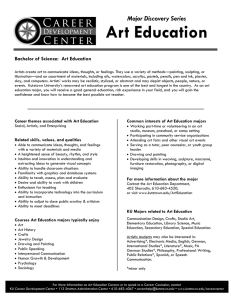History Major Discovery Series Bachelor of Arts: History
advertisement
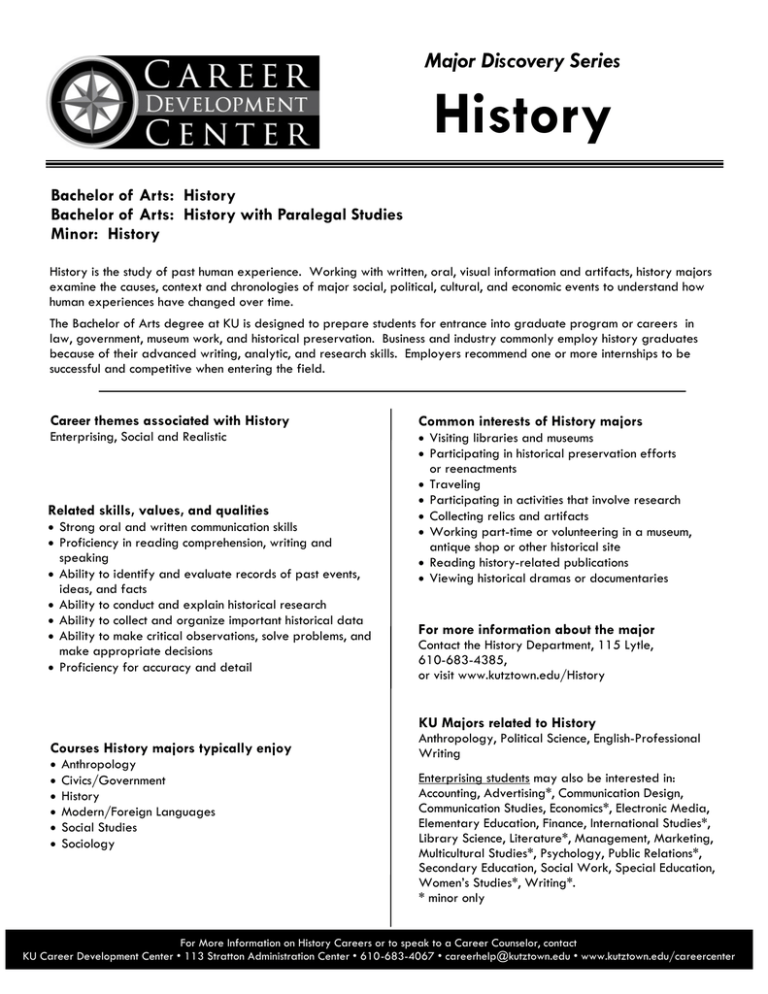
Major Discovery Series History Bachelor of Arts: History Bachelor of Arts: History with Paralegal Studies Minor: History History is the study of past human experience. Working with written, oral, visual information and artifacts, history majors examine the causes, context and chronologies of major social, political, cultural, and economic events to understand how human experiences have changed over time. The Bachelor of Arts degree at KU is designed to prepare students for entrance into graduate program or careers in law, government, museum work, and historical preservation. Business and industry commonly employ history graduates because of their advanced writing, analytic, and research skills. Employers recommend one or more internships to be successful and competitive when entering the field. Career themes associated with History Common interests of History majors Enterprising, Social and Realistic Visiting libraries and museums Participating in historical preservation efforts Related skills, values, and qualities Strong oral and written communication skills Proficiency in reading comprehension, writing and speaking Ability to identify and evaluate records of past events, ideas, and facts Ability to conduct and explain historical research Ability to collect and organize important historical data Ability to make critical observations, solve problems, and make appropriate decisions Proficiency for accuracy and detail or reenactments Traveling Participating in activities that involve research Collecting relics and artifacts Working part-time or volunteering in a museum, antique shop or other historical site Reading history-related publications Viewing historical dramas or documentaries For more information about the major Contact the History Department, 115 Lytle, 610-683-4385, or visit www.kutztown.edu/History KU Majors related to History Courses History majors typically enjoy Anthropology Civics/Government History Modern/Foreign Languages Social Studies Sociology Anthropology, Political Science, English-Professional Writing Enterprising students may also be interested in: Accounting, Advertising*, Communication Design, Communication Studies, Economics*, Electronic Media, Elementary Education, Finance, International Studies*, Library Science, Literature*, Management, Marketing, Multicultural Studies*, Psychology, Public Relations*, Secondary Education, Social Work, Special Education, Women’s Studies*, Writing*. * minor only For More Information on History Careers or to speak to a Career Counselor, contact KU Career Development Center • 113 Stratton Administration Center • 610-683-4067 • careerhelp@kutztown.edu • www.kutztown.edu/careercenter Attend your senior kick-off and other info sessions to prepare for job search/grad school. Enroll in the Career Success Update your resume and Certificate. LinkedIn profile. Complete an internship and/or Meet with CDC career Create cover letter drafts. undergraduate research. coach. Enroll in the Career Gain experience through Attend info sessions about Attend info sessions to learn Exploration Certificate. internships and/or internships, interviewing, job about resume writing, and Attend info sessions to learn undergraduate research. search strategies, and grad externships. about career development Secure references for job/grad school. Confirm your choice of major and personal branding. school applications. Build a LinkedIn profile and and consider options for Take a career assessment to continue to monitor your online Create your “30 second” double major or minor. identify and confirm interests. commercial. presence. Research careers of interest. Get involved in campus clubs Meet with CDC to develop Complete a mock interview. Complete a job shadowing and organizations. job search strategies. Build skills through research (externship) experience. Develop basic workplace skills Research employers. projects, part-time employment, through jobs or volunteer work. Seek meaningful employand volunteer work. Network with professionals ment or volunteer work in a Talk with professors, family, through events and social Participate in Coffee and field related to your major. and friends about career media. Convos & networking programs. Explore options for underideas. Join a professional organization Attend internship & job fairs. graduate research and Conduct informational in your discipline. Take on a leadership role in a study abroad. interviews with professionals Attend the senior etiquette student organization or work. Write a resume and have it working in fields of interest. dinner. Consider graduate school reviewed by the CDC. Develop a relationship with Participate in job fairs and options and prepare for Manage your online your professors and faculty on-campus interviewing. admissions tests. presence. advisor. Sample Career Titles History majors can be found working in a wide variety of career fields. Here are just some career titles that may be of interest. Please note that some jobs may require further education and training. Anthropologist Archeologist Archivist Biographer Clergy Community Relations Director Congressional Aide Consumer Advocate Counselor Criminologist Demographer Economist Editor FBI / CIA Agent Foreign News Correspondent Foreign Service Officer Genealogist Gerontologist Government Official Historian Historic Preservation Specialist Historic Site Tour Guide Historical Society Staff Member Human Service Worker Insurance Agent/Broker Intelligence Analyst International Relations Specialist Journalist Judge Lawyer Lecturer Legal Assistant/Paralegal Librarian Lobbyist Market Research Analyst Media Consultant Museum Curator Museum Technicians & Specialist Newspaper Reporter Paralegal Assistant Park Ranger Peace Corps/Vista Worker Political Scientist Psychologist Public Administrator Public Relations Specialist Research Assistant Research Library Assistant Sociologist Teacher, Social Studies Technical Writer Travel Agent Urban Administrator Urban Planner Writer/Author To learn more about these careers, visit http://online.onetcenter.org or www.bls.gov/ooh. Common Internship Sites and Employers History majors often find internships and employment in the following industries: Business & Industry Communications Media Courts and Law Offices Educational Institutions Historical Societies and Archives Libraries/Magazines/Newspapers Military and Para-Military Groups Non-Profit Organizations Research Foundations State/Federal Government KU Career Network is the primary online resource for preparing and connecting students and alumni with employers. www.kutztown.edu/KUCN Useful Websites for History Majors Whether you are researching related career fields, applying for internships or jobs, or planning to join a professional association, these websites are for you! Industry Information and Job/Internship Search Sites Career Resources for History Majors http://careers.cua.edu/explore/ historyresources.cfm Careers in Government www.careersingovernment.com Center for History and New Media http://chnm.gmu.edu Government Jobs www.governmentjobs.com H-Net Job Guide www.h-net.org/jobs/home.php History Job Search Resources www.pmc.edu/history-job-search-resources Law Student Center www.hg.org/students.html Making the Difference www.makingthedifference.org Museum Employment Resource Center www.museum-employment.com USA Jobs www.usajobs.gov Professional Associations American Association of Museums www.aam-us.org American Assoc. for State & Local History www.aaslh.org American Historical Association www.historians.org National Council for History Education www.nche.net National Council on Public History http://ncph.org National Federation of Paralegal Associations www.paralegals.org Oral History Association www.oralhistory.org Organization of American Historians www.oah.org Society for Historians of American Foreign Relations www.shafr.org U.S. Naval Institute www.usni.org Building Your Resume for a Career in History Building a strong resume for your career field starts long before you ever start your job search. Employers want to hire graduates who not only have the necessary educational background but also have experience applying that knowledge to real life situations. Take note of the skills and knowledge obtained through your educational background and hands-on experiences. Highlight transferable skills such as fluency and adaptability. Learn more about your field and develop the necessary skills for employment by gaining hands-on experience through externships, internships, part-time jobs and related volunteer positions. Develop professionally through campus involvement and professional memberships. This illustrates responsibility, leadership abilities and time management skills.
